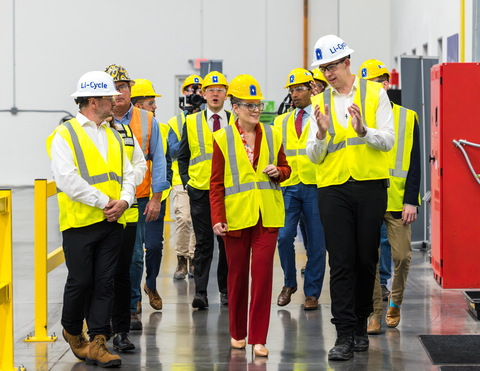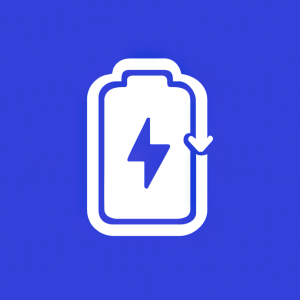Governor Katie Hobbs Visits Li-Cycle’s Lithium-Ion Battery Recycling Facility in Arizona

During the visit, the Governor was joined by Tim Johnston, Li-Cycle’s co-founder and Executive Chair, for a tour of Li-Cycle’s Spoke facility, which leverages innovative technology to recycle lithium-ion battery materials. The Company’s proprietary submerged shredding recycling process has the capability to process full electric vehicle (EV) and energy storage battery packs without any manual disassembly or discharging, and can recycle all types of lithium-ion battery materials regardless of chemistry or form factor.
Li-Cycle’s Arizona Spoke facility, which can recycle up to of 18,0001 tonnes of lithium-ion battery material per year, is expected to play a key role in building a clean energy future in the
"Li-Cycle's lithium-ion battery recycling is critical to powering our future economy, and their
“We were delighted to have the opportunity to host Governor Hobbs at our Spoke facility in
About Li-Cycle Holdings Corp.
Li-Cycle (NYSE: LICY) is a leading global lithium-ion battery resource recovery company and North America’s largest pure-play lithium-ion battery recycler, with a rapidly growing presence across
Forward-Looking Statements
Certain statements contained in this press release may be considered “forward-looking statements” within the meaning of the
These forward-looking statements are provided for the purpose of assisting readers in understanding certain key elements of Li-Cycle’s current objectives, goals, targets, strategic priorities, expectations and plans, and in obtaining a better understanding of Li-Cycle’s business and anticipated operating environment. Readers are cautioned that such information may not be appropriate for other purposes and is not intended to serve as, and must not be relied on, by any investor as a guarantee, an assurance, a prediction or a definitive statement of fact or probability.
Forward-looking statements involve inherent risks and uncertainties, most of which are difficult to predict and many of which are beyond the control of Li-Cycle, and are not guarantees of future performance. Li-Cycle believes that these risks and uncertainties include, but are not limited to, the following: Li-Cycle’s inability to economically and efficiently source, recover and recycle lithium-ion batteries and lithium-ion battery manufacturing scrap, as well as third party black mass, and to meet the market demand for an environmentally sound, closed-loop solution for manufacturing waste and end-of-life lithium-ion batteries; Li-Cycle’s inability to successfully implement its global growth strategy, on a timely basis or at all; Li-Cycle’s inability to manage future global growth effectively; Li-Cycle’s inability to develop the Rochester Hub, and other future projects including its Spoke network expansion projects in a timely manner or on budget or that those projects will not meet expectations with respect to their productivity or the specifications of their end products; Li-Cycle’s failure to materially increase recycling capacity and efficiency; Li-Cycle may engage in strategic transactions, including acquisitions, that could disrupt its business, cause dilution to its shareholders, reduce its financial resources, result in incurrence of debt, or prove not to be successful; one or more of Li-Cycle’s current or future facilities becoming inoperative, capacity constrained or if its operations are disrupted; additional funds required to meet Li-Cycle’s capital requirements in the future not being available to Li-Cycle on acceptable terms or at all when it needs them; Li-Cycle expects to continue to incur significant expenses and may not achieve or sustain profitability; problems with the handling of lithium-ion battery cells that result in less usage of lithium-ion batteries or affect Li-Cycle’s operations; Li-Cycle’s inability to maintain and increase feedstock supply commitments as well as securing new customers and off-take agreements; a decline in the adoption rate of EVs, or a decline in the support by governments for “green” energy technologies; decreases in benchmark prices for the metals contained in Li-Cycle’s products; changes in the volume or composition of feedstock materials processed at Li-Cycle’s facilities; the development of an alternative chemical make-up of lithium-ion batteries or battery alternatives; Li-Cycle’s revenues for the Rochester Hub are derived significantly from a single customer; Li-Cycle’s insurance may not cover all liabilities and damages; Li-Cycle’s heavy reliance on the experience and expertise of its management; Li-Cycle’s reliance on third-party consultants for its regulatory compliance; Li-Cycle’s inability to complete its recycling processes as quickly as customers may require; Li-Cycle’s inability to compete successfully; increases in income tax rates, changes in income tax laws or disagreements with tax authorities; significant variance in Li-Cycle’s operating and financial results from period to period due to fluctuations in its operating costs and other factors; fluctuations in foreign currency exchange rates which could result in declines in reported sales and net earnings; unfavorable economic conditions, such as consequences of the global COVID-19 pandemic; natural disasters, unusually adverse weather, epidemic or pandemic outbreaks, cyber incidents, boycotts and geo-political events; failure to protect or enforce Li-Cycle’s intellectual property; Li-Cycle may be subject to intellectual property rights claims by third parties; Li-Cycle’s failure to effectively remediate the material weaknesses in its internal control over financial reporting that it has identified or if it fails to develop and maintain a proper and effective internal control over financial reporting. These and other risks and uncertainties related to Li-Cycle’s business are described in greater detail in the section entitled “Risk Factors” and “Key Factors Affecting Li-Cycle’s Performance” in its Annual Report on Form 20-F filed with the
Li-Cycle assumes no obligation to update or revise any forward-looking statements, except as required by applicable laws. These forward-looking statements should not be relied upon as representing Li-Cycle’s assessments as of any date subsequent to the date of this press release.
______________________
1 Total processing capacity includes main line and ancillary processing.
View source version on businesswire.com: https://www.businesswire.com/news/home/20230629351795/en/
Investor Relations
Nahla A. Azmy
Sheldon D’souza
investors@li-cycle.com
Media
Louie Diaz
media@li-cycle.com
Source: Li-Cycle Holdings Corp.







